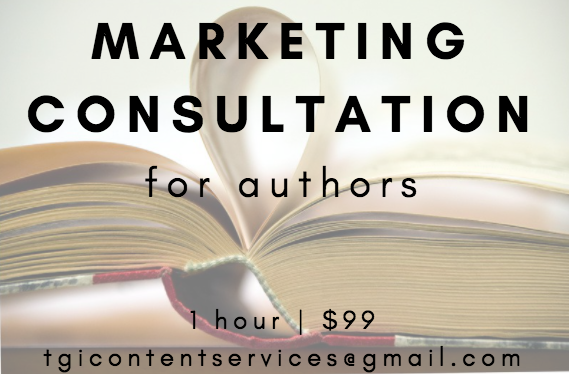Many indie authors identify marketing as their biggest challenge, especially in the sci-fi and fantasy genres. When you’re creative, it’s difficult to keep writing while you have the responsibility of marketing – especially if you’ve got a full-time job, a family, or other obligations that take time in your day. The writing, editing, and publishing process is extensive: but it’s only a portion of the challenge when it comes to getting your book into the hands of willing readers.
Why Am I Qualified To Deliver This Advice?
I’ve been in the publishing, marketing, and gaming industries for the last fifteen years. I began my career journey by following my love for books: my first full-time job was at the self-publishing company Xlibris. Back in 2003, I knew Xlibris was doing something revolutionary, as they were among the first to publish and promote ebooks. I enjoyed helping writers become authors through the publication process and began editing expedited projects at that company. Unfortunately, my job was was outsourced and I had to pack up my desk and send it to my overseas replacement. I returned to Xlibris to help them manage a self-publishing product in coordination with Borders, but Borders soon closed its doors as well.
Following that, I continued to pursue editorial work in academic publishing. My career also took me into marketing, where I served as a blog editor for the international marketing company SEMrush. I later joined a content agency as an editor and also did a fair amount of work for them in sales.
All the while, I continued to edit independently, helping authors improve their work prior to publication. Most of the authors I work with are recommended by word of mouth. Being a geek and running this website, I’ve primarily edited in the following genres: sci-fi, fantasy, suspense, and romance. I’ve also worked on memoirs and other nonfic.
You can learn more about my qualifications on my LinkedIn page.
It’s All About Community
In various online groups, I always see authors asking for advice about where to advertise or what to do to get their books on the shelves. What they fail to understand is that there are many companies and consultants out there easy to do a business transaction – to provide authors with products and services that my have some value, but fail to harness the author’s inherent talents, assets, and niche.
Niche Considerations
Some of your marketing will happen around your niche, how you define it, and how you clearly define your genre. You can leverage this in several ways:
- Book Cover: Can you define your genre by your book cover? I’ve seen a lot of sci-fi and fantasy books with very generic covers. Consider an illustration of your main character, a map of your fantasy world in the background, or a view of the stars, depending on your genre. Even the font on the cover and spine should reflect the content of your book. Before you consult with a cover artist, take a look at some popular books in your genre and ask yourself what you’d emulate and what you’d do differently to convey the aesthetic of your book.
- Book Blurb: Does the summary online and on the back of your book also define its genre? Especially if you’re doing something new in your genre or bridging genres, this is important. It should also convey your writing style and reading level: is your book for young adults or mature audiences?
- Join Communities: Niches have communities. Ideally, you’ve invested years in these communities before you think about marketing a book in them. Your marketing truly begins well before your book is finished, and that means staying connected in your genre. Niche doesn’t just mean genre, either: you could have a fantastic sci-fi novel that also relates to themes like humanism, politics, space exploration, technology, and world building. World builders might have an interest in seeing how your sci-fi novel turns out it you’re a regular, active part of the community years before you publish.
Define Your Unique Selling Proposition (USP)
If you’re in a community while you’re writing (you should be), you should always have your genuine USP in mind. This will also help with the writing process. USP is sales and marketing lingo, but that doesn’t mean it has to involve a slimy sales approach. That’s not worth doing, and people respond to sincerity anyway.
You can start to define your USP (or what makes your book unique) by answering the following questions:
- What makes your book different from any other book out there?
- What makes your book unique in its genre(s)?
- What kind of person would be interested in reading the book you have created?
- Does this book fulfill a particular desire or wish from its audience? Is it useful in a way that no other books are? How?
- Does your book take advantage of a trend in the genre or in culture? If so, what?
- What is the strongest benefit a reader can have from buying your book? How will it change their lives or entertain them in a way that nothing else can?
Ultimately, your unique selling proposition is about what your book can do for your reader. Most authors don’t really think about this, especially not before they start writing – if you do, you’ll be ahead of the game when it comes to marketing and creating copy about your book when it’s time to sell it.
Invest in Personal Branding
Your book is only part of what you’re selling. No matter your audience, the truth is that you are also a brand. Whether you have two followers or two million, this will never change. From the beginning, you need to take control of the type of image you’d like to project about yourself.
This is a process of self-discovery. As an author, you’ve probably put a lot of yourself into your work. Don’t hide from that. Being personal, if you’re able, is going to help – but there are also limits to how personal you should be to your readers. That line is different for everyone; it’s also more or less marketable for everyone. It can change. If you think about it as you begin, you’ll feel more confident and you’ll have a plan.
Your brand includes more than just the personality you project to your fans. Here are some things to think about when it comes to your brand and how you wish to define as an author:
- Are you going to use a pen name? If so, will you separate your work from other areas of your personal and professional life? Will that make it more or less difficult to market your book?
- Whether you choose a pseudonym or not, what kind of persona will you adopt (if any) to promote your brand? Will you act differently towards readers than other people you’ll encounter in your daily life?
- What colors represent you as an author? What does your logo look like? What about your actual imprint, should you decide to self-publish? Choose something that will reflect all the work you create – not just one novel.
- When you appear online (and hopefully have your own website), what type of memorable logo, quotes, and photos will you have? What makes you memorable compared to all the other authors out there?
Branding is often an expense, whether it costs time or money. If you’re able, hire a designer to create something special (reach out to us at tgicontentservices@gmail.com – we have people who do that). If not, consider a free or low-cost service like Canva. Since my budget is limited, I use Canva for various blog graphics all the time, but make sure to spend money on main images like book covers and website logos.
Stay Social
It’s fairly obvious that digital marketing involves social media. Readers and writers know all about communities like Goodreads.
Online Launch Parties
Many authors and small publishers choose to throw online launch parties to celebrate the release of a book. Unless you’re already receiving national news attention, it’s not likely you’ll be doing much out of the ordinary on this day offline. Even if you’re having an in-person celebration, it’ll probably only take a few hours.
Let’s talk about what you can accomplish online.
Melissa Cutler recommends considering your reasons for a launch party. She advises that the most important reason for throwing a virtual party is to thank your fans, followers, and supporters.
These people sustain you and help you, and they’re the foundation of the community-centric marketing approach vital for authors, especially those working in genres like sci-fi and fantasy, which have dedicated and enthusiastic fans.
If you’re into streaming like me, consider hosting a virtual launch party on a streaming service or video platform like Twitch.
Don’t forget to incentivize people to come to the launch party. What do they get? Retweets from your social media accounts? A free copy of your book? A discount code?
Stay Social: In Person
Launch Parties
You can lure people in with food. You can post pictures online. You can have lovely copies of your book everywhere.
In-person launch parties are all about celebration and getting the word out about the book – and it’s another wonderful time to celebrate people who support you. It’s not just about the people who come to the event, though. It’s about the way you’re perceived online. Think about how this crafts your persona and builds your reputation. This is more about publicity and branding than selling books.
Go Beyond Author Signings
Author signings are, like in-person launch parties, more about the branding and promotion than the sales of books. Many authors get discouraged because they don’t sell too many books. To maximize the potential of your author signing, consider a broader approach when speaking with a book store about doing one:
 Give a talk on your favorite subject matter (as it’s related to your book). This is especially important for nonfiction authors, but you can tie some great real-life topics into your talk, too, even if you are a fiction author. For example: a sci-fi author might discuss technology in three bestselling sci-fi novels or five books that Star Trek fans might enjoy. If the book shop helps you promote, those topics could bring a captive audience of potential readers, and the talk could end with a signing.
Give a talk on your favorite subject matter (as it’s related to your book). This is especially important for nonfiction authors, but you can tie some great real-life topics into your talk, too, even if you are a fiction author. For example: a sci-fi author might discuss technology in three bestselling sci-fi novels or five books that Star Trek fans might enjoy. If the book shop helps you promote, those topics could bring a captive audience of potential readers, and the talk could end with a signing.- Consider a Q&A session to accompany your book. This could work with a talk and signing or without. I saw a really successful Q&A with author Sam Maggs, and I purchased the book there.
- Remember that indie book stores and libraries are also all about community. They thrive and survive on them. They’re also used to people dropping the ball, so formulate a pitch about author talks and Q&As – position it as something to benefit the community and they’ll be far more open to letting an indie author do a book signing.
And when you do these events, don’t forget to collect email addresses for your email list and hand out any marketing collateral you may have (such as bookmarks).
Conventions and Niche Events
Especially for geeks and authors whose genres have more fan-oriented events, conventions are important. Authors are frequently discouraged due to low book sales – but like other events, conventions aren’t just about book sales. They are opportunities. Don’t schedule yourself stuck behind a table all day vending. Take someone with you and have them help. You should also do other things, such as:
- Be a guest speaker
- Take part in a panel
- Attend scheduled networking events
Goal-setting is important for conventions. When I attended Gen Con 50, I set a goal of meeting 100 authors in hopes of gaining some editing clients and building my email list. I met the goal (barely). The goal was essential to pushing me forward during the last 15 minutes of networking.
The more serious leads I’ve generated come as a result of speaking as an expert on a panel.
Inbound Digital Marketing For Authors
Inbound marketing is useful content that draws in customers – in your case, readers. As a marketer and editor, I’ve written this guide as a piece of inbound marketing content. I’m hoping you’ll reach out and contact me for editing and consulting services after you decide you’ve found this content useful.
You can use inbound content in a few ways:
- Gather email addresses for your email list
- Bring people to the site and have them buy your book directly
- Increase your reputation as an author and subject matter expert
- Market without being salesy
I’m not really comfortable “selling” to people, especially not to authors on a budget. I’m much more comfortable creating content like this. This way, I’m giving you specialized information and esoteric knowledge before I’m asking you to consider something. It’s more like an invitation. That will make you different than the many authors who post links all over the place.
Remember: you’re building a community.
Your Blog
Authors are among my favorite marketing clients for a very good reason: they already have talent as an asset. You can blog about topics related to your book and easily, naturally grow your audience. People love it way more than spammy link posting, and you can always ask them to sign up for your email for more blog posts and place a link to your book on the side of the blog or at the end of the post.
Ending your posts with a call to action (CTA) is important – pick one thing and ask the reader to do it. Examples include:
- What’s your favorite fantasy novel with a female protagonist? Comment below! [Increased engagement is helpful!]
- Want more regular posts about sci-fi? Sign up to my email list here. I’ll email you no more than once per week to let you know about the latest posts on this blog.
- Want to read more like this excerpt? Check out my book here [link].
Guest Blogging
Guest blogging helps you harness the audience of another channel or author. Authors often exchange guest blogs to accomplish this. I like exchanging guest posts with someone who has a similar audience, but not exactly the same. That way, we’re not competing, but sharing our audiences. This is really helpful when I’m trying to branch out in a new area. You’ll want to find someone with an audience size similar to or somewhat larger than yours.
This is another favorite recommendation for authors. Non-writers need to invest heavily in this type of marketing – but you already have the necessary skills.
Your guest post should focus on something relevant to the other person’s blog. For example, if you were a fantasy author posting here on The Geek Initiative, our editor-in-chief might work with you to formulate a blog post about the most inspiring sidekicks in fantasy films and novels. At the end, you’d be welcome to link to your own book and mention it in your author bio.
Your Content Plan
Once you’re done your book, there’s so much work to do in the publishing process. While your book is with the editor, you can start to work on your content plan – essential to help you market your book. This will include:
- Content (blog posts, videos, story excerpts) you plan to create
- Events you wish to create (IRL and virtual)
- Social media posts promoting and creating the content and events
- Holiday promotions (Got a horror novel coming out before Halloween? A family-friendly book publishing before Christmas? These are opportunities)
I use Airtable and CoSchedule to manage these processes.
Your Discussion Channels
Access is important. Once you get your first few fans – yes, even just a few – you should consider creating a special channel in which only your fans can speak with you or get advance content. Maybe they get to see your blog posts first or get info about your latest writing. Limited access keeps generating interest, and it keeps their attention captive.
You can do this in a few ways, depending on where your audience lives:
- Facebook group
- Discord or other voice platforms
- Slack
Consider Patreon
Many authors also make more money on their writing through Patreon than they do on their published books. Especially prolific authors with a following will do well here – and you can sell that limited channel access (see above) through Patreon, too.
Once you sign up for Patreon, you should consider a joining the Patreon Writers Engagement Pod group on Facebook.
Marketing Collateral
Most authors are eager to dive into the realm of marketing collateral. Some self-publishing companies charge an exorbitant amount of money for these. If you go out on your own, you can get them much cheaper. Companies like PrintLlama can offer you a much better deal on your marketing materials, even if you’re still hiring a graphic designer to create them. (Our graphic designers can help you out there.)
Business Cards
Business cards are essential for any type of event. You should also have them on you at all time. Your business cards should include:
- Your name
- Website URL
- Email address
- Phone number
- Title and type of work you do
You don’t need the most expensive, flashiest card, but you should have the basics. Plus, your card should match your own aesthetic and branding whenever possible. The Geek Initiative’s site colors are reflected on my business card, for example, and the website designer also designed the card for complete consistency.
Bookmarks
Bookmarks are additional marketing collateral item, but more often than not, authors fail to put any more than the book title on the bookmark. A decent designer can find a creative way to squeeze a website URL on there. Following Gen Con, I couldn’t find a few of the authors I wanted to interview or work with knowing the book title alone. That’s right – some authors didn’t even include their own names or book cover images.
Transparent Writing, Editing, and Design
Ever notice how non-writers are fascinated by the writing process? You can harness that natural curiosity by granting your audience access to the process. This accomplishes a few things:
- Motivates you to create more, as you have an eager audience
- Potentially creates another income stream – I do this by writing live on Twitch, where subscribers and fans give me bits and subscriptions
- Creates trust between author and audience
- Allows audience to provide input, making them feel like they really have a part in the process
Your First Fans: Give Them Access
Transparency doesn’t stop at social media updates and live streams. Your fans and supporters will love having access, and you can provide that as a reward you post exclusively in your community, whether you decide to gate it in a Patreon or subscription-only Discord channel or not.
A Note About Press Releases and Print Advertising
Authors frequently ask about press releases and print advertising. Generally, press releases are a thing of the past, at least in the hard copy sense. Don’t invest in those “faxed press releases” some publishers still offer. Most people now send and receive press releases via email, and the modern press kit is stored on Google Drive.
Your Book: An Expensive Business Card
It’s a harsh truth, but also a helpful one: for many, a book turns out to be an expensive business card rather than something that makes them money. In the right conditions, your book can turn a profit – but what if it doesn’t? It’s still useful, and you can use your published novel in other ways.
- Books are cornerstones of personal branding and professional authority.
- A long-form published work is your gateway to speaking engagements and further employment opportunities.
- The book increases visibility and gets attention when you hand it out as a business card to a high-value contact.
Build Your Email List
The most valuable and difficult piece of advice I have to offer is this: build your email list. Mailchimp provides many free and inexpensive options to create and segment your email list. I’ll write a more detailed piece on this later as I am still in the process of doing that for this site. Come back soon to find out what I’ve learned.
Did you find this information valuable? It’s a lot – and this is just the beginning. Let’s talk about a customized marketing solution for your book – sci-fi, fantasy, or otherwise.
Receive an hour long consultation for $99. Email tgicontentservices@gmail.com.













